
2020: A vision for the future through Co-ops and local food
As the 2010s come to a close, the “20/20” eyesight analogy couldn’t be more appropriate for the new decade. With our eye on the future, there’s clearly a sense of urgency and awareness of the unique times we’re living in: a changing climate, increases in costs of living, and the shared pressures of a globalized world.
We face a decision in the coming decade where we prioritize convenience and cost, or community and climate. It’s my hope as General Manager that shopping at the Co-op provides you community through our classrooms and events, as a place to meet and eat with friends, and convivial customer service; and offers hope for our climate, through our local buying practices, and our sustainability and zero waste initiatives. But I also don’t want you to compromise on convenience and cost, because it seems clear that healthy local food and a healthy local economy are intertwined.
Put another way, it’s the way the Co-op has always been run: people, principles, and the planet before profit. And it’s by sticking to this maxim that the cooperative model will continue to thrive in the ‘20s. Shopping at the Co-op is sort of a way to ‘vote with your dollar’ and know that it’s being maximized in our community. Here are a few ways that’s happening:
The planet: We continue to be the most sustainable grocer in Southern Oregon and we’re on pace with our 2030 zero waste goal - now just ten years away. The Co-op’s sustainability coordinator and strategic energy management intern have been working on further reducing energy waste, from simple things like lowering the blinds at night to prevent heat loss, to storewide impacts like lowering the temperature of our water heaters.
And in 2020, the Co-op joins four other Ashland restaurants for the Rogue To Go reusable take-out container program, set to reduce the amount of take-out waste - a big move for the busiest restaurant in Ashland (yep, the Co-op!).
One of the biggest greenhouse gas contributors is the factory farming industry, which is why we go to great lengths - but not distances - to get local, grass-fed meats from sustainable producers like Magnolia Farms and Emerald Hills Farms, and to source other meats from responsible and sustainable sources, like Beeler’s Heluka and SmartChicken. Meanwhile we continue to expand our vegan offerings in store and in our kitchen.
Principles: With over $29,000 in grants to non-profits last year, and another $2,450 in donated gift cards, your shopping trips at the Co-op are - in no small part! - helping out the organizations doing important front-line work on food and education in the Valley. Read more about 2019 grant recipients here.
People: We understand that one of the Rogue Valley’s biggest issues is cost of living. To that end, over 70% of our employees earn a living wage and 96% have access to affordable health care. When you shop at the Co-op, you’re supporting over 160 employees and their families who contribute to our community and the local economy. There are a lot fewer than six degrees of separation here in the Rogue Valley - if you don’t already know a Co-op employee, one of your friends probably does!
I’m excited for the sustainable, responsible path that we are on in order to face the challenges of the coming decade. Thank you for being a part of our community and for supporting our efforts to advance it.
In co-operation,
Emile Amarotico
General Manager
More Co-op News

Planning for Summer... and Smoke
By Emile Amarotico, General Manager
If we are lucky, we’ll only have another seven week smoke intrusion this summer. If we are not, we could be the next Paradise. In less than 13 hours, last November’s Camp Fire wiped out nearly 19,000 structures and more than 80 lives. With community help, we were able to raise over $14,000 to support Chico Natural Foods Co-op’s efforts to feed some of the nearly 20,000 displaced Paradise residents.
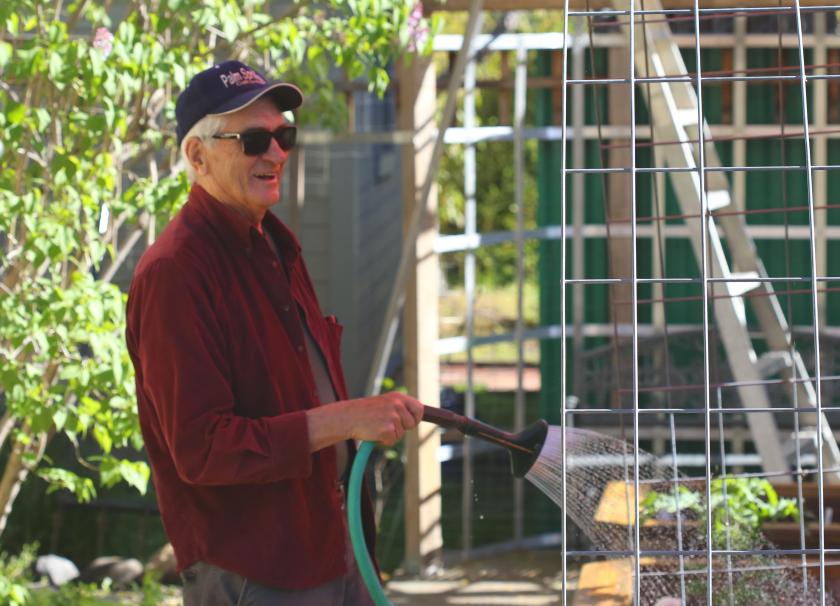
The Co-op's "Secret Garden"
Did you know the Co-op employees have a small garden on our campus? Planning and management falls on our fantastic Co-op volunteer: Henry Herting.
Below, Henry shares some background on the garden, what it’s used for, and some additional tales from over the years.
Originally, the need for a kitchen garden arose from having a kitchen classroom in which culinary classes were being held. Visiting chefs have always been invited to use the garden for any ingredients they may have forgotten or items they could use as garnish for their dishes.
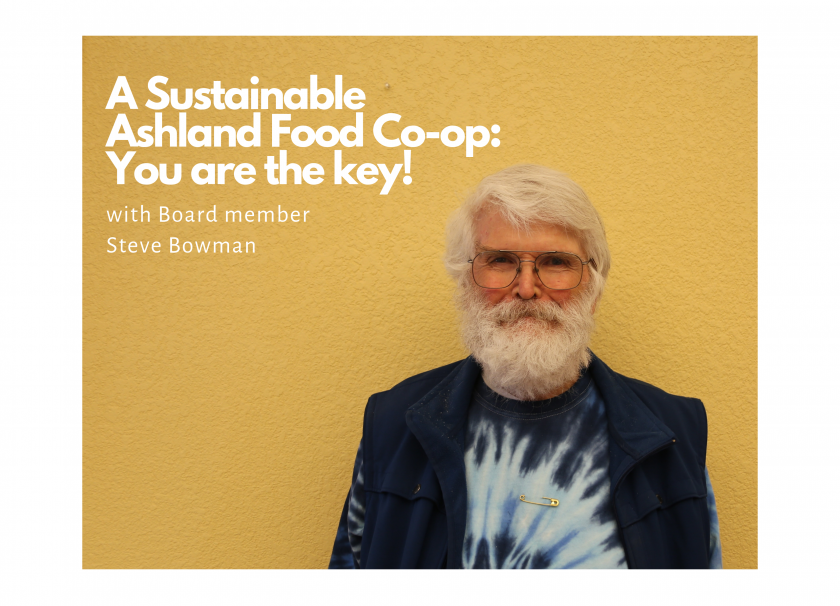
Sustainable Ashland Food Co-op: You are the key!
By Steve Bowman, AFC Board Director
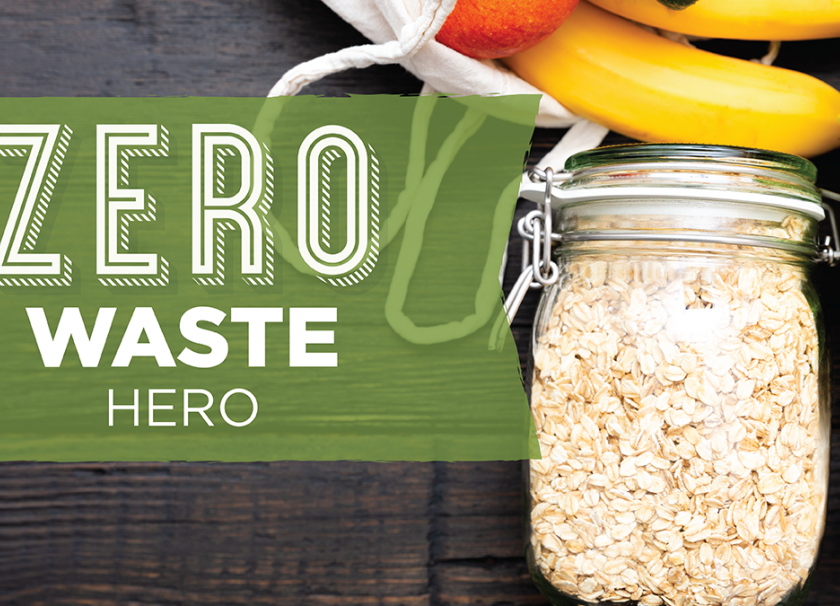
Tips for a Sustainable Kitchen
By Mahlea Rasmussen, Education Coordinator
Outside of work I spend a lot of time in the kitchen. I find it a soothing space to create nourishing meals and lasting memories. I find it essential to be as eco-friendly as possible and a few changes can transform your kitchen into a sustainable center of your home.
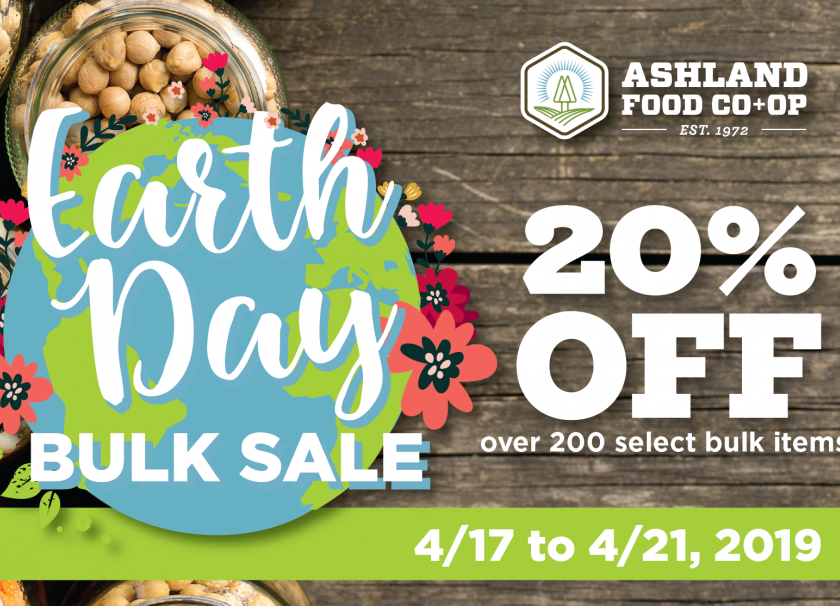
Earth Day Bulk Sale! April 17-21
Save money while working towards a more sustainable shopping experience! The Co-op bulk department is a great "first stop" for your grocery lists - everything from hummus mix to local honey to pet food is available. Plus there's less waste, all the way from shipping to ended up in your shopping cart.
Check out a quick tour below:

Film festival giveaway
Enter your name and email below to be entered to win two film vouchers for the 2019 Ashland Independent Film Festival.
No purchase necessary. Giveaway is not endorsed or sponsored by AIFF. US residents only. Entry will be closed at 5pm PT on Monday, April 15.

The state of plastics
Many Co-op owners and shoppers have shared their interest in reducing plastic usage in the store. From bioplastics, to compostable plastics to recycling options, the Ashland Food Co-op continues to research what works best as we move towards our goal of being a zero waste store. Here is where we stand.
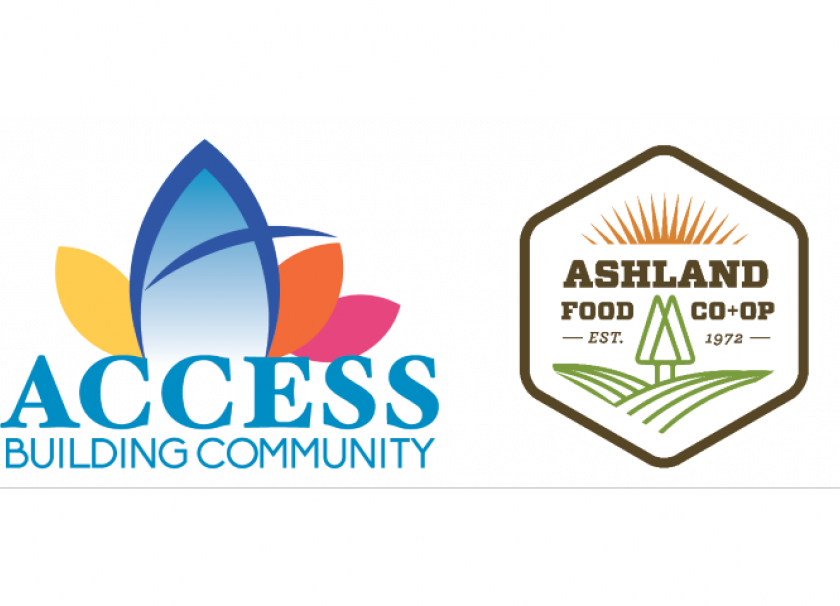
Ashland Food Co-op Celebrates 20-year Partnership with ACCESS
We are proud of a partnership with ACCESS that has benefited the community immensely over the past twenty years. Read on for more about the partnership, or watch the short video below.
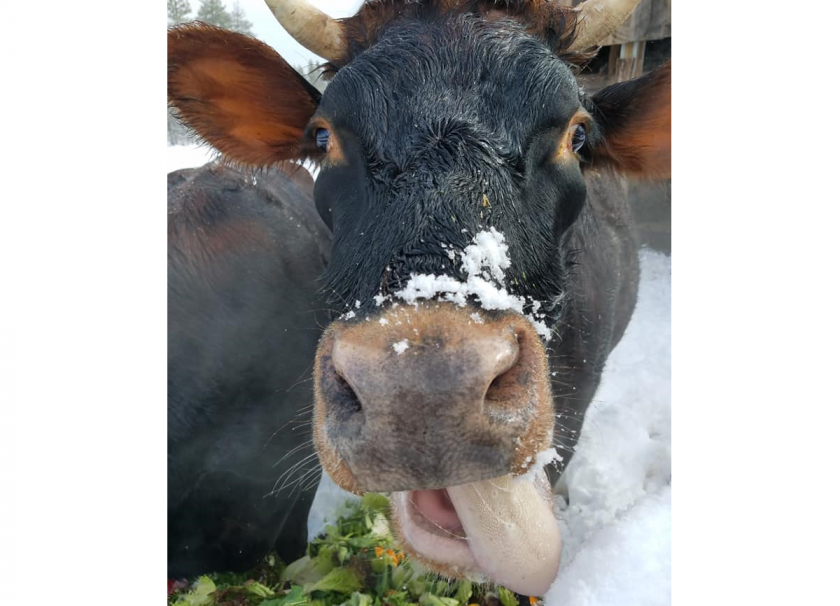
Food waste at the Co-op
By Rianna Koppel, Sustainability Coordinator
How many times in the past month have you reached back in the fridge to snack on some fresh strawberries only to discover… mold?! In the United States, 40% of food is wasted every year. Luckily, how we address food waste can have a major impact. According to Paul Hawkin’s Drawdown, reducing food waste is #3 on the list of best ways to reduce carbon dioxide emissions. At the Co-op, we use the EPA’s Food Recovery Hierarchy as a guide to bettering our own practices.
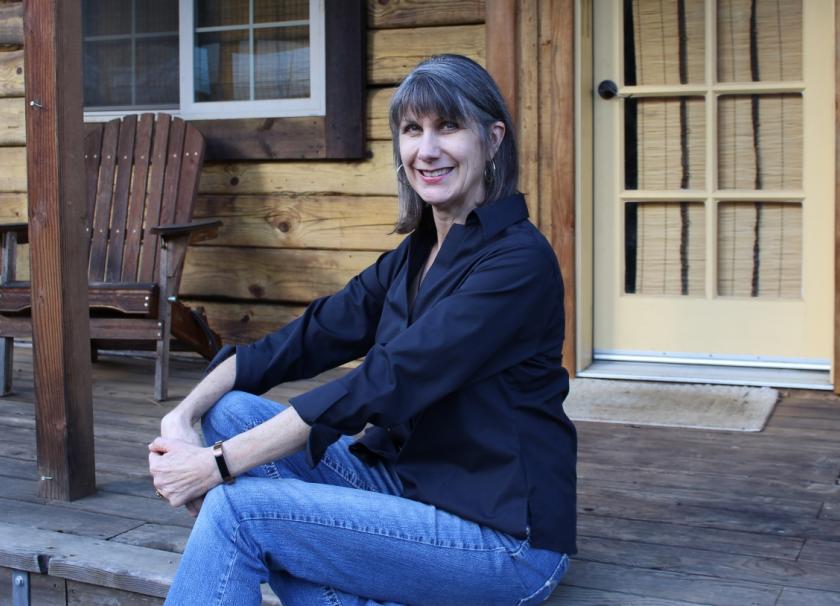
Meet Cooking Class Instructor, Gianaclis Caldwell
Get to know Gianaclis Caldwell ahead of her class, "Easy Mozzarella and Burratta - From Scratch!" on March 7. Gianaclis is the author of the award-winning book Mastering Artisan Cheesemaking and owner of Pholia Farm.
Tell us how your love of cooking (or cheese) and food began.
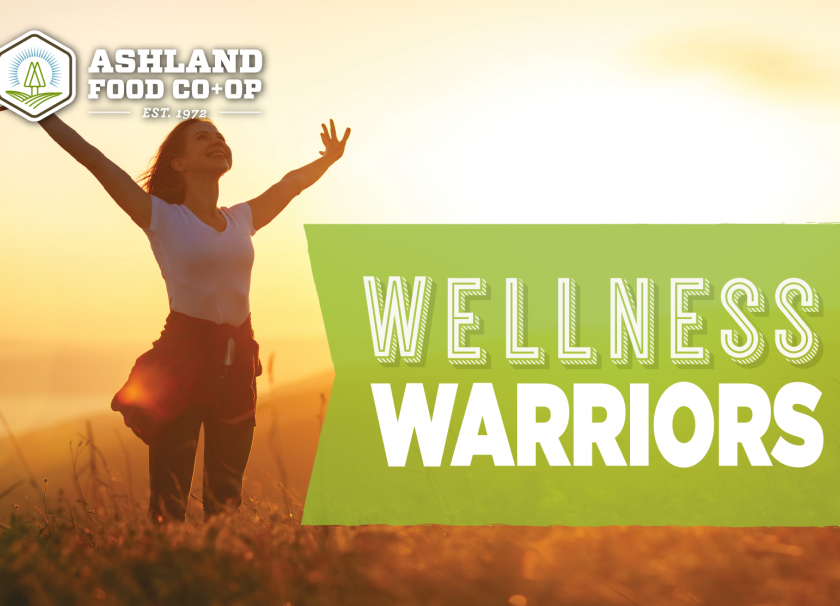
Wellness Secret Weapons
There are still plenty of colds and viruses making their rounds, and we want to help you better defend against them!
In January, we asked on social media what kind of secret weapons you use in the winter to stay healthy. We had a lot of responses, so we'll start with the All-Stars.
With your initial recommendations, our Wellness team reviewed the suggestions and picked the products with the highest quality standards and best feedback. Check those out below.
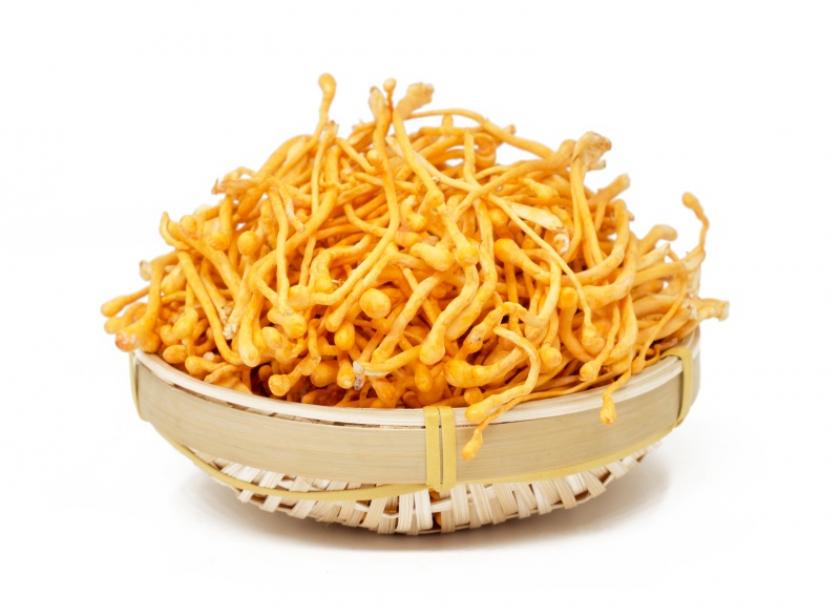
Mushrooms for wellness
You may have heard about the fascinating discovery that trees can communicate with each other. What’s the secret? The mycelia - tiny strands of fungus - in the soil form a vast underground network through which trees send chemical signals to their neighbors.
The mycelia differs from the fruiting body of the mushroom, which is the reproductive component that contains spores and is thought to be higher in Beta Glucans.

Meet class instructor, Joette Calabrese
This class instructor profile is connected to the February 27 free lecture, "You, Too, Can Beat the Flu!"
On an early Kolkata (Calcutta) morning, thick crowds gather outside the gates of the hospital while officials yell out "Brain tumor, kidney failure, cancer patients form a line here!” Hopeful patients, family members and caregivers arrange themselves by disease symptom.
What to do with all this citrus?!
So you grabbed a few too many extra oranges and grapefruits and lemons (and some finger limes, and some satsumas…), and rather than watch them go bad, we want to provide you with some ideas on how to reduce waste. You’ll also get to enjoy citrus in a lot of new ways!
There are many guides and recipes across the internet (like this one by our friends at Grow Forage Cook Ferment), so here are a few ideas to get your creative and citrus juices flowing.
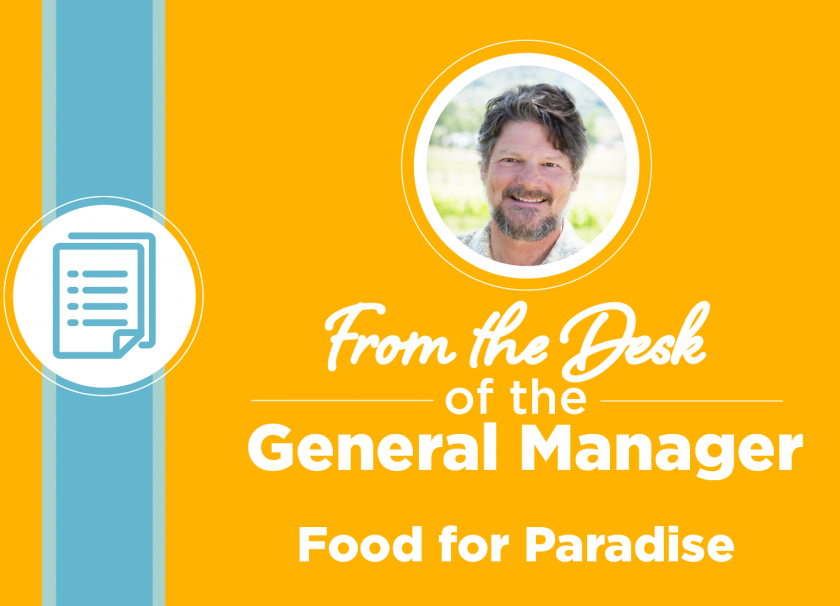
Update from the General Manager: "Food for Paradise" campaign
Ashland Food Co-op's General Manager, Emile Amarotico, ends 2018 on a very uplifting note with a report back on the "Food for Paradise" donation campaign. Watch the video below, or read on for an extended written update.
Hello, this is Emile Amarotico, the general manager of Ashland Food Co-op with an update on the Co-op’s Food for Paradise initiative.
